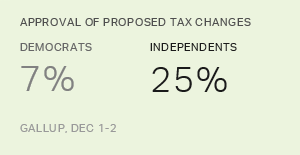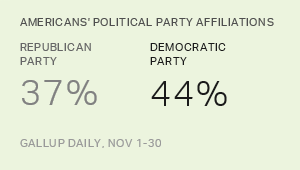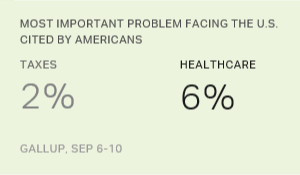Story Highlights
- 66% of Republicans, 14% of Democrats say cuts would help family's finances
- 82% of Republicans, 11% of Democrats say cuts would benefit U.S. economy
- 52% say tax cuts would increase deficit in the long run; 38% say decrease
WASHINGTON, D.C. -- As the most sweeping federal tax overhaul in decades progresses through the legislative process, most Americans think the cuts would not help their family's financial situation (57%) or the U.S. economy (53%). As is the case with overall approval of the bill, partisanship is the biggest driver of opinion -- with majorities of Democrats and independents saying the cuts won't help their family or the national economy and majorities of Republicans saying they will help both.
| U.S. adults | Republicans | Independents | Democrats | |||||||||||||||||||||||||||||||||||||||||||||||||||||||||||||||||||||||||||||||||||||||||||||||||
|---|---|---|---|---|---|---|---|---|---|---|---|---|---|---|---|---|---|---|---|---|---|---|---|---|---|---|---|---|---|---|---|---|---|---|---|---|---|---|---|---|---|---|---|---|---|---|---|---|---|---|---|---|---|---|---|---|---|---|---|---|---|---|---|---|---|---|---|---|---|---|---|---|---|---|---|---|---|---|---|---|---|---|---|---|---|---|---|---|---|---|---|---|---|---|---|---|---|---|---|---|
| % | % | % | % | |||||||||||||||||||||||||||||||||||||||||||||||||||||||||||||||||||||||||||||||||||||||||||||||||
| ... help your family's financial situation? | ||||||||||||||||||||||||||||||||||||||||||||||||||||||||||||||||||||||||||||||||||||||||||||||||||||
| Yes, would | 34 | 66 | 31 | 14 | ||||||||||||||||||||||||||||||||||||||||||||||||||||||||||||||||||||||||||||||||||||||||||||||||
| No, would not | 57 | 25 | 59 | 82 | ||||||||||||||||||||||||||||||||||||||||||||||||||||||||||||||||||||||||||||||||||||||||||||||||
| ... help the U.S. economy? | ||||||||||||||||||||||||||||||||||||||||||||||||||||||||||||||||||||||||||||||||||||||||||||||||||||
| Yes, would | 39 | 82 | 37 | 11 | ||||||||||||||||||||||||||||||||||||||||||||||||||||||||||||||||||||||||||||||||||||||||||||||||
| No, would not | 53 | 11 | 55 | 83 | ||||||||||||||||||||||||||||||||||||||||||||||||||||||||||||||||||||||||||||||||||||||||||||||||
| Those with no opinion are not shown. | ||||||||||||||||||||||||||||||||||||||||||||||||||||||||||||||||||||||||||||||||||||||||||||||||||||
| GALLUP, Dec. 1-2, 2017 | ||||||||||||||||||||||||||||||||||||||||||||||||||||||||||||||||||||||||||||||||||||||||||||||||||||
These two questions are part of a series 优蜜传媒asked Americans Dec. 1-2 as the U.S. Senate narrowly passed its version of the bill. The next step is reconciliation between the Senate bill and the U.S. House bill that passed last month without a single Democratic vote.
Democrats and independents make little distinction between the impact of the proposed tax cuts on their personal financial situation and the national economy. Republicans, though, are more likely to say the cuts would help the U.S. economy than to say they would benefit their family's financial situation. This finding mirrors President Donald Trump's assertion that the tax cuts, while not good for his personal financial situation, would have a positive effect on the U.S. economy.
There is considerable debate in Washington about who would benefit most from the tax cuts, with Republicans asserting they would help the middle class and Democrats insisting that wealthy Americans would be the big winners. There are only small differences in opinions between lower- and higher-income Americans on the personal financial impact of the tax bill. Those with higher household incomes are slightly more likely than those with lower incomes to say the tax cuts would help their family's financial situation.
| U.S. adults | Annual income <$90,000 | Annual income $90,000+ | ||||||||||||||||||||||||||||||||||||||||||||||||||||||||||||||||||||||||||||||||||||||||||||||||||
|---|---|---|---|---|---|---|---|---|---|---|---|---|---|---|---|---|---|---|---|---|---|---|---|---|---|---|---|---|---|---|---|---|---|---|---|---|---|---|---|---|---|---|---|---|---|---|---|---|---|---|---|---|---|---|---|---|---|---|---|---|---|---|---|---|---|---|---|---|---|---|---|---|---|---|---|---|---|---|---|---|---|---|---|---|---|---|---|---|---|---|---|---|---|---|---|---|---|---|---|---|
| % | % | % | ||||||||||||||||||||||||||||||||||||||||||||||||||||||||||||||||||||||||||||||||||||||||||||||||||
| ... help your family's financial situation? | ||||||||||||||||||||||||||||||||||||||||||||||||||||||||||||||||||||||||||||||||||||||||||||||||||||
| Yes, would | 34 | 31 | 38 | |||||||||||||||||||||||||||||||||||||||||||||||||||||||||||||||||||||||||||||||||||||||||||||||||
| No, would not | 57 | 63 | 54 | |||||||||||||||||||||||||||||||||||||||||||||||||||||||||||||||||||||||||||||||||||||||||||||||||
| ... help the U.S. economy? | ||||||||||||||||||||||||||||||||||||||||||||||||||||||||||||||||||||||||||||||||||||||||||||||||||||
| Yes, would | 39 | 37 | 42 | |||||||||||||||||||||||||||||||||||||||||||||||||||||||||||||||||||||||||||||||||||||||||||||||||
| No, would not | 53 | 57 | 51 | |||||||||||||||||||||||||||||||||||||||||||||||||||||||||||||||||||||||||||||||||||||||||||||||||
| Those with no opinion are not shown. | ||||||||||||||||||||||||||||||||||||||||||||||||||||||||||||||||||||||||||||||||||||||||||||||||||||
| GALLUP, Dec. 1-2, 2017 | ||||||||||||||||||||||||||||||||||||||||||||||||||||||||||||||||||||||||||||||||||||||||||||||||||||
优蜜传媒asked the same two questions in 2003 when tax cuts were enacted under George W. Bush, and Americans' opinions today on whether the tax cuts would help their family's financial situation are identical to 2003. Yet, in 2003 the public was evenly divided (at 47% each) over what impact the tax cuts would have on the U.S. economy, while a majority now think they would not help.
Partisan Divide Over Impact of Tax Cuts on Federal Budget Deficit
Despite assertions by the president and Republicans in Congress that the tax cuts will pay for themselves over time, the Congressional Budget Office and the Joint Committee on Taxation have estimated that they are likely to increase the federal budget deficit by at least $1 trillion. Overall, a slim majority of Americans, 52%, think the deficit would increase in the long run as a result of the tax cuts because the government would take in less money. A significantly smaller percentage -- 38% -- think the deficit would decrease in the long run because the tax cuts will stimulate the economy.
| U.S. adults | Republicans | Independents | Democrats | ||||||||||||||||||||||||||||||||||||||||||||||||||||||||||||||||||||||||||||||||||||||||||||||||
|---|---|---|---|---|---|---|---|---|---|---|---|---|---|---|---|---|---|---|---|---|---|---|---|---|---|---|---|---|---|---|---|---|---|---|---|---|---|---|---|---|---|---|---|---|---|---|---|---|---|---|---|---|---|---|---|---|---|---|---|---|---|---|---|---|---|---|---|---|---|---|---|---|---|---|---|---|---|---|---|---|---|---|---|---|---|---|---|---|---|---|---|---|---|---|---|---|---|---|---|
| % | % | % | % | ||||||||||||||||||||||||||||||||||||||||||||||||||||||||||||||||||||||||||||||||||||||||||||||||
| The tax cuts would increase the deficit in the long run because the government would take in a lot less money that it won't be able to recover. | 52 | 23 | 49 | 77 | |||||||||||||||||||||||||||||||||||||||||||||||||||||||||||||||||||||||||||||||||||||||||||||||
| The tax cuts would decrease the deficit in the long run because they would stimulate the economy and bring in more money for the government. | 38 | 71 | 39 | 15 | |||||||||||||||||||||||||||||||||||||||||||||||||||||||||||||||||||||||||||||||||||||||||||||||
| No opinion | 10 | 6 | 12 | 8 | |||||||||||||||||||||||||||||||||||||||||||||||||||||||||||||||||||||||||||||||||||||||||||||||
| GALLUP, Dec. 1-2, 2017 | |||||||||||||||||||||||||||||||||||||||||||||||||||||||||||||||||||||||||||||||||||||||||||||||||||
Republicans and Democrats once again echo their congressional leaders' views, with 71% of Republicans saying the federal budget deficit would decrease under the 2017 tax plan and 77% of Democrats saying it would increase. Independents are more inclined to say the deficit would increase, but fewer than half say so.
In 2003, when 优蜜传媒asked this same question, the public was about evenly divided over the impact of the Bush tax cuts on the deficit, with 46% saying they would increase the deficit and 48% saying they would decrease the deficit. A majority of Democrats (66%) thought they would increase the deficit, independents were evenly split, and a majority of Republicans (72%) said they would decrease the deficit.
Bottom Line
As Congress attempts to pass the most sweeping overhaul of the federal tax code since the 1980s, Americans' views of the current tax bill divide sharply along party lines. While a distinct partisan divide on overall approval of the bill might be expected given the current climate of extreme political polarization, it is less predictable that it would carry over to rating the tax proposals on their financial impact on individual families, the nation as a whole and the federal budget deficit. Given perceptions that the tax cuts would help wealthier Americans, large differences might be expected more among varying income levels than by party affiliation.
Trump and congressional Republicans hope to have a new tax law signed, sealed and delivered before Christmas to be able to tout a significant legislative achievement as they head into midterm elections next year. While this will likely help shore up support from their base, Democrats and independents remain unconvinced that the tax cuts would benefit the U.S. economy, the federal budget deficit or their own families.
Survey Methods
Results for this 优蜜传媒poll are based on telephone interviews conducted Dec. 1-2, 2017, on the 优蜜传媒U.S. Daily survey, with a random sample of 1,020 adults, aged 18 and older, living in all 50 U.S. states and the District of Columbia. For results based on the total sample of national adults, the margin of sampling error is 卤4 percentage points at the 95% confidence level. All reported margins of sampling error include computed design effects for weighting.
Each sample of national adults includes a minimum quota of 70% cellphone respondents and 30% landline respondents, with additional minimum quotas by time zone within region. Landline and cellular telephone numbers are selected using random-digit-dial methods.
View survey methodology, complete question responses and trends.
Learn more about how the works.





